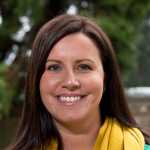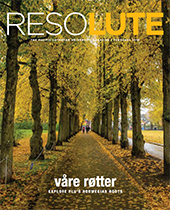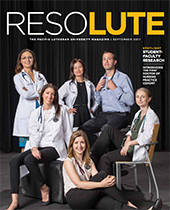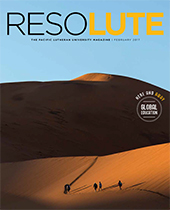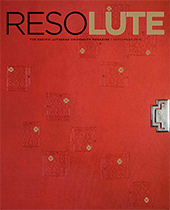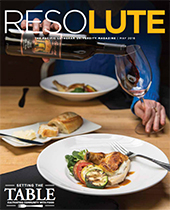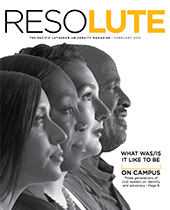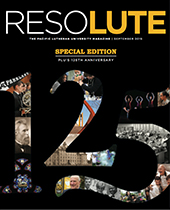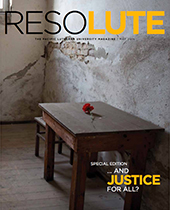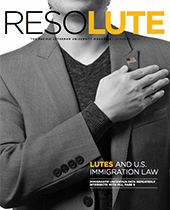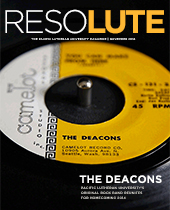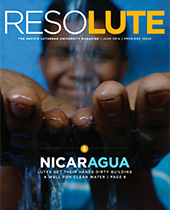Recent PLU Graduates on their Careers, Convictions & Passion for Health Care
TACOMA, Wash. (Dec. 21, 2014)—All over the world, Pacific Lutheran University alumni are serving in a wide variety of roles in hospitals, clinics, research centers and public-health agencies, sharing a steadfast commitment of delivering world-class medical care, treatment and counseling.
We recently caught up with four recent PLU graduates who are making an impact in health care; here they share their specialty areas, their motivations and the role PLU played in preparing them for their careers.
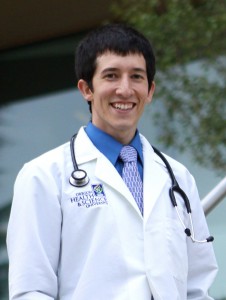
Andrew Reyna, Medical Student, Oregon Health & Sciences University School of Medicine
PLU Graduation Year: 2011
Degree: B.S. Biology
Hometown: Salem, Ore.
Current Residence: Portland, Ore.
What sort of medical doctor are you planning on becoming, and why?
I chose to go into family medicine because of the opportunity to care for anyone, regardless of age, for nearly any issue. As a family doctor, I can maximize my impact within the community and touch as many lives as possible. Ultimately, family medicine provides an opportunity for me to combine my passion for service and my talents in order to meet one of the world’s greatest needs in primary medical care.
What have you enjoyed most about medical school?
One particularly enjoyable piece of medical school is having the ability and time as a student to sit down with patients and learn about them beyond their diagnoses. It truly is a gift to work in an environment where there is the opportunity to meet so many diverse people, make connections and have the chance to make a positive impact on their life during times of hardship. Another enjoyable aspect of medical school is being surrounded by other equally passionate medical students always looking to engage the community in meaningful ways through various clubs, organizations or volunteer groups.
How did studying Biology at PLU help prepare you for medical school?
Sitting among other medical students from Ivy League schools or “big name” universities was at first a little intimidating, but I soon realized that my undergraduate education was in many ways superior to that of my peers. At PLU, not only were the courses intellectually challenging, but the courses were exclusively taught by faculty (instead of TAs) who were also easily accessible and approachable. The combination of a variety in course options, rigorous coursework and a supportive faculty strongly prepared me for immediate success in my medical education.
What motivates you?
The biggest factor motivating me is the desire to make a difference within my community. For me, that means providing primary healthcare for underserved patients who are in need of care and not currently able to access it for a variety of reasons. My ultimate goal is to positively impact the quality of life of my patients by working collaboratively with them to optimize their health.
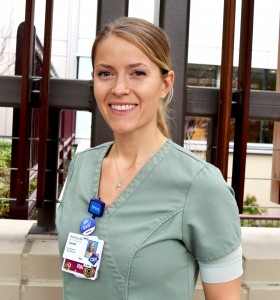
Candis LeBaron, Registered Nurse with Emergency Nurse Certification, Tacoma General Hospital Emergency Room
PLU Graduation Year: 2009
Degree: B.S. Nursing
Hometown: Anchorage, Alaska
Current Residence: Tacoma, Wash.
What specifically does your work in the Tacoma General ER entail?
There are different roles that I fill within the Emergency Department. In triage, I assess and sort patients according to the severity/urgency or their presentation. When I have a room assignment, I spend the day listening to stories and investigating symptoms, explaining processes and making people feel comfortable and safe during a time of pain and confusion. Finally, I teach, trying to help people understand what they are experiencing physically and hopefully empowering them to take care of themselves from that moment forward.
How did studying Nursing at PLU help prepare you do go to work at Tacoma General right after graduating?
PLU provided me with an abundance of clinical, hands-on experience that helped make the transition from school to work life less daunting. The nursing program really hones critical thinking skills and prepared me to take a more creative approach to problem solving.
How did you choose Nursing as a field and a career?
Nursing kind of jumped out at me when I looked at career lists. It was the career that I felt fit me best: flexible hours, good pay, physically active, challenging and mentally stimulating. Most important, it has variety and lets me be around lots of new people each day.
What do you enjoy most about your work?
Every day is different; new challenges, new faces and new ways to help people. I can have a bad day, and the next day is a fresh slate, a new variety of people and symptoms to organize, treat and comfort.
What motivates you?
I’ve been a patient. I’ve been a patient’s family member. It’s scary, not knowing and not feeling well. As a nurse, I can make the patient experience a little bit better, a little less harsh. Nursing ranks high as one of the most trusted professions, and I am motivated to contribute to that.
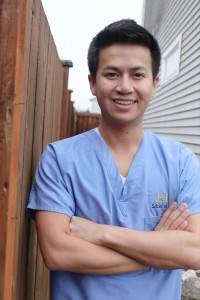
Henry Tieu, Registered Nurse, St. Joseph Medical Center Cardiac ICU
Graduation Year: 2014
Degree: B.S. Nursing
Hometown: Soc Trang, Vietnam
Current Residence: Tacoma, Wash.
What specifically does your work in the St. Joseph’s Cardiac ICU entail?
I take care of critically ill patients, most of whom require total care since they have to be on ventilators. My job is not only about the patients but also their families. I teach what I’ve learned so my patients and their families understand what they are going through and what they can do to keep on fighting.
How did studying Nursing at PLU help prepare you to work in an ICU just a few years after graduation?
PLU School of Nursing has taught me many great things about being a competent nurse. However, if I have to pick one, I would have to say “self-reflection.” I still remember that after each day of clinical, we sat down with our clinical instructor and talked about what we had learned, what we had done and what we wished we could have done differently. Self-reflection allows me to explore my strengths and weaknesses, thus challenging me and empowering me to become the best version of myself. Self-reflection has become a part of my nursing routines everyday at work. In other words, PLU School of Nursing has helped me become a competent nurse who values safe and quality care.
What do you enjoy most about your work?
Nursing for me is not just a job; it’s a career. I enjoy my career because I get to be with other people and do what I can to help when they are at the most vulnerable moments in their lives. I get to see my patients walk out of the hospital and go home with their families. I also get to see my patients share their last laugh or last tears with their loved ones. No matter what the outcomes are, I am honored to be a part of their struggles and triumphs. I look at nursing as an opportunity to grow as a person, to contribute to something or someone other than myself, and to empower others to become the best version of themselves.
What motivates you?
I’m motivated by the life lessons I’ve learned from my patients. Working in the ICU has allowed me to see that good health is a blessing and that anything can happen. I’ve learned to live in the moment and to never take anything for granted. Nursing has become a part of my life and now my identity.
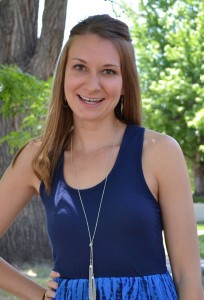
Brianne Burnett, Clinical Case Manager, Mental Health Center of Denver
Graduation Year: 2011
Degree: B.A. Psychology
Hometown: Mount Vernon, Wash.
Current Residence: Denver, Colo.
Can you share the overview of what your work as a Clinical Case Manager entails?
I work one-on-one with approximately 30 individuals who I see in my office at a mental-health center, in their homes and in the community. I’m on a unique team that services adults with severe and persistent mental-health illnesses as well as a substance-abuse diagnosis. My time is split between helping clients work on their symptoms and connecting them to resources to help aid in their recovery.
How did studying Psychology at PLU help prepare you for your graduate studies and your current career?
Studying Psychology helped form my clinical background prior to going to social-work school, which was helpful because social work largely focused on systems and policies, rather than the individual. I have to say that my ethics came largely from my undergraduate experience, as that was the time when I began to think critically about ethical concerns and how I would approach them. Psychology also gave me a “leg up” in graduate school because I already had the foundation for many of the theoretical concepts of the therapies I now use on a daily basis.
How did you choose which area of Psychology and Social Work you wanted to focus on? Or, if you feel like you’ve yet to completely choose, can you share a bit about that process?
I chose social work because it allowed me the quickest, easiest and most efficient route to get to therapy, but even in that statement, it’s obvious my heart lies in psychology. Unfortunately, post-graduate careers with an advanced psychology degree are harder to come across. I am very passionate about industrial and organizational psychology, as well. I wouldn’t be surprised if my future career eventually led me in that direction. Over the years, I have learned the my biggest passion lies in focusing on a career that allows me to help people, and thankfully social work provides many avenues to explore that. I think I still am exploring it.
What do you enjoy most about your work?
I love the opportunities within social work to do ANYTHING—you can work in the community, in a hospital, in another country or from home—the possibilities are endless. I enjoy that as a growing profession, research is expanding in this field and the emphasis on evidenced-based practices is growing and supporting the work that some people have been doing for years. I also have a newfound love for “resiliency.” Resiliency is probably one of the most beautiful things I have ever seen in my life, and in working with the populations that I do, I am continually blown away by human resiliency.
What motivates you?
Bah. Today? I’m not sure (laughs). I’m motivated by the hopes of making a difference. I live religiously by the quote that I originally used on my PLU admissions essay to answer the question by Mary Oliver, “What will you do with your one wild and precious life?” I responded with the quote, “What do we live for if not to make life less difficult for one another?” by George Eliot. I am continually motivated by this quote and remind myself that I don’t need to fix the world or solve all the problems. I just need, for today, to make life a little less difficult for one person. Maybe that’s just walking through this journey of life with them and being there so they don’t have to be alone.
To Learn More or Ask Questions About PLU’s Healthcare-Focused Majors and Academic Programs, Please Visit:
School of Nursing | School of Nursing Facebook
Pre-Professional Health Sciences | Department of Biology
Division of Social Sciences | Department of Psychology





